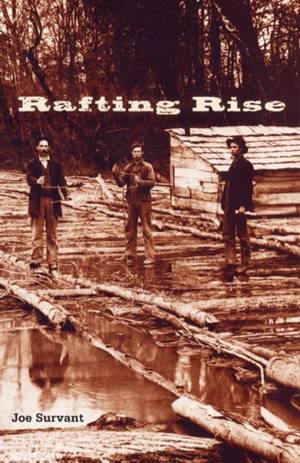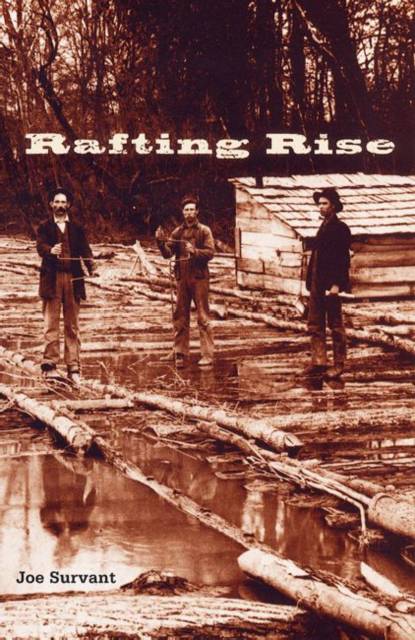
- Retrait gratuit dans votre magasin Club
- 7.000.000 titres dans notre catalogue
- Payer en toute sécurité
- Toujours un magasin près de chez vous
- Retrait gratuit dans votre magasin Club
- 7.000.0000 titres dans notre catalogue
- Payer en toute sécurité
- Toujours un magasin près de chez vous
Description
"Rafting Rise is a terrific book, the richly detailed evocation of an entire world, and an important contribution to the literature of the rural South."--Ted Kooser
"Rafting Rise has the strength of extended narrative and the quickness of lyric poetry. There is a haunting, visionary quality to Joe Survant's dramatic poem, bringing to life a world of log rafting and floodplain dwellers along the Rough and Green Rivers in 1916 and 1917. The sections are snapshots and ballads of witness, a counterpoint of voices that open a window on this long-ago time and place, of giant catfish and spells, logjams and river witch. The phrases shine and the lines sing out, and the dead come back and speak again, as the real enters the realm of legend."--Robert Morgan
"Joe Survant writes about turn-of-the-century backwoods America with an uncanny sense of firsthand knowledge. He knows whereof he writes, and he writes with an authority that derives from a deep-seated respect for the lives of river folk and trappers and the lone inhabitants of 'womenless shacks.' And for all the harsh realities of a life hacked out of such rough terrain, Mr. Survant never overlooks the beauty of 'sycamores grazing by the creek, ' wild grapes growing in the river bottoms, or a thicket lit by trumpet weed. To read this book is to enter a world, and to follow its narrative is to be carried on the current of a deeply compelling adventure."--Sherod Santos
Set in the central Kentucky basins of the Rough, Green, and Ohio Rivers in 1916-17, Rafting Rise joins the storytelling virtues of fiction with the intensity of the poetic lyric to reach a wider audience, including readers of poetry, lovers of good tales, and those interested in the small events of history recreated through the lives of carefully imagined characters.
The book's central action is the rafting of logs in winter down the rivers to the lumber mills in Evansville, Indiana. Survant re-creates the whole fabric of the hardscrabble society that lives by this perilous trade. They are tough people, such as Carl Peters, stranded on a raft run aground in a freezing rain, walking in a figure eight all night to stay alive while his fellow rafter Tom Simpson, who didn't make it, ". . . lay/like frozen wood/in the bottom of our boat." Elsewhere, in love poems and poems celebrating the lush riverine landscape, Survant conveys the simple, sensuous moments that punctuate this hard life. Here is Bill Balcom at a camp meeting, eighteen and chafing for adventure on the river: "When I took/a piece of Susie's buttermilk pie, /I saw her looking, /and when I ate/I imagined/ her taste."
But none of the characters is more vivid than Sallie, the female protagonist, a half-mad medicine woman living with her dogs in whatever shelter she can find. Survant gives Sallie such a deep empathy with the countryside and its creatures that she becomes the spirit of the place. But Sallie pays dearly for her empathy with nature, hearing voices over which she has no power. Worse, she has the curse of prophecy, can see the hand of death before it strikes, and is as much feared as needed by the community.
Through these and a handful of other characters, Survant fashions a verse epic of Kentucky on the eve of the entry of the United States into World War I. This volume continues the experiment begun in his earlier Anne & Alpheus, combining poetry and narrative to tell the story of several generations connected by place and memory across the artificial boundaries of time.
Joe Survant is professor of English at Western Kentucky University and author of The Presence of Snow in the Tropics; Anne & Alpheus, 1842-1882, winner of the Arkansas Poetry Award.
Spécifications
Parties prenantes
- Auteur(s) :
- Editeur:
Contenu
- Nombre de pages :
- 96
- Langue:
- Anglais
- Collection :
Caractéristiques
- EAN:
- 9780813025889
- Date de parution :
- 31-12-02
- Format:
- Livre relié
- Format numérique:
- Genaaid
- Dimensions :
- 155 mm x 209 mm
- Poids :
- 254 g

Les avis
Nous publions uniquement les avis qui respectent les conditions requises. Consultez nos conditions pour les avis.






